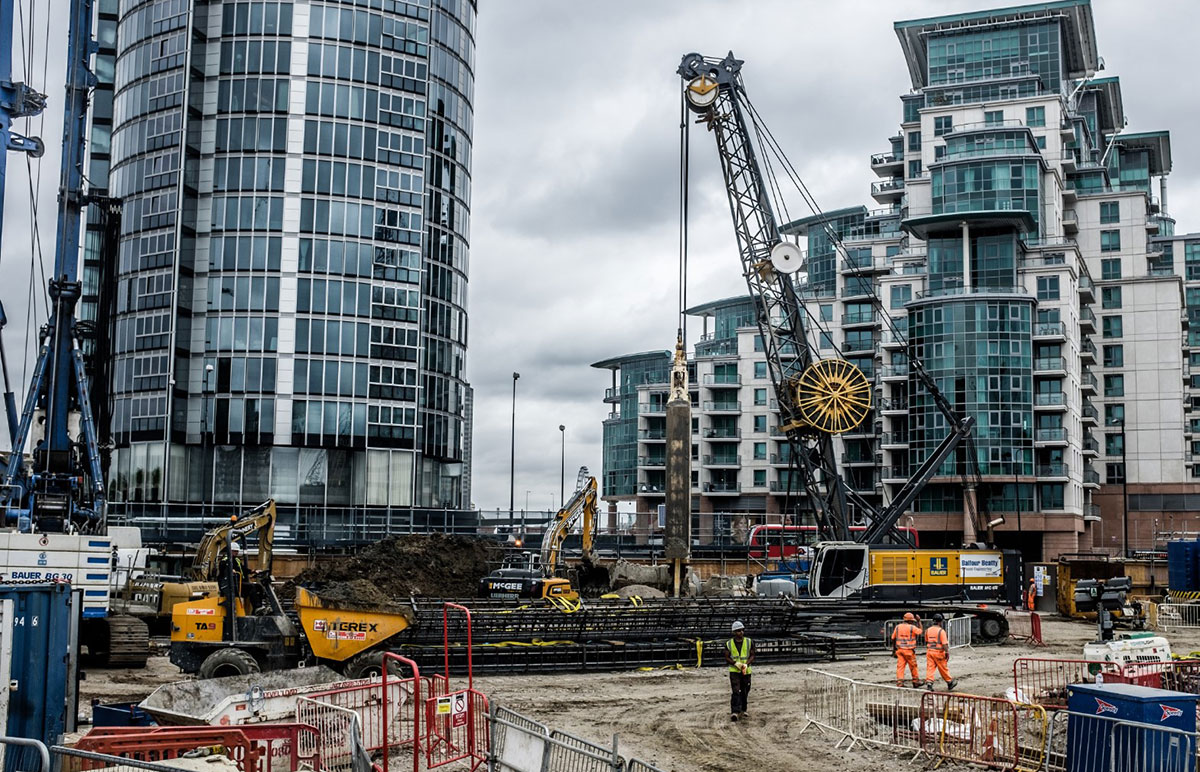The Only Guide for Geotheta
The Only Guide for Geotheta
Blog Article
The smart Trick of Geotheta That Nobody is Talking About
Table of ContentsThe Best Guide To GeothetaExcitement About GeothetaSome Ideas on Geotheta You Need To KnowSome Ideas on Geotheta You Should KnowThe Best Guide To Geotheta

They carry out site examinations, collect samples, execute research laboratory examinations, and assess information to evaluate the suitability of the ground for building jobs - Consulting Engineer. Based upon their searchings for, geotechnical designers give recommendations for foundation design, incline security, keeping structures, and mitigation of geotechnical risks. They work together with various other specialists, such as architects, structural engineers, and construction groups, to make sure that geotechnical factors to consider are incorporated into the overall task design and implementation
By evaluating the behavior and properties of dirt and rock, they can recognize prospective geotechnical hazards such as landslides, dirt negotiation, or incline instability. Their competence aids protect against failings or mishaps that can jeopardize lives and residential property. Below are some detailed obligations and duties of a geotechnical designer: Website Examination: Geotechnical engineers conduct website examinations to gather information on subsurface conditions.
They translate the data to recognize the properties and behavior of the dirt and rock, including their stamina, permeability, compaction qualities, and groundwater conditions. Geotechnical Evaluation and Layout: Geotechnical engineers examine the data collected throughout site investigations to assess the security and viability of the site for construction projects. They do geotechnical computations and modeling to evaluate variables such as bearing ability, settlement, slope stability, lateral planet stress, and groundwater flow.
The 4-Minute Rule for Geotheta
Structure Design: Geotechnical designers play an essential duty in developing foundations that can safely sustain the desired framework. They assess the soil conditions and load requirements to determine the proper foundation type, such as superficial foundations (e.g., grounds), deep structures (e.g (https://www.pageorama.com/?p=geotheta)., piles), or specialized methods like soil enhancement. They take into consideration aspects such as settlement limitations, bearing capability, and soil-structure interaction to create optimum structure styles
They examine construction plans, monitor site activities, and conduct area evaluations to confirm that the layout suggestions are adhered to. If unpredicted geotechnical problems occur, they assess the scenario and give recommendations for remediation or adjustments to the style. Danger Assessment and Mitigation: Geotechnical designers analyze geotechnical risks and threats connected with the job website, such as landslides, liquefaction, or dirt erosion.

Partnership and Communication: Geotechnical engineers function closely with other specialists associated with a task, such as engineers, structural engineers, and construction teams. Effective interaction and collaboration are important to integrate geotechnical considerations right into the general project layout and construction process. Geotechnical engineers provide technical experience, solution queries, and make certain that geotechnical needs are met.
The Ultimate Guide To Geotheta
Below are some types of geotechnical designers: Foundation Designer: Foundation engineers focus on designing and examining structures for structures. They analyze the dirt conditions, lots demands, and website features to identify the most suitable foundation type and design, such as superficial foundations, deep foundations, or specialized methods like pile structures.
They assess the variables affecting slope stability, such as dirt residential properties, groundwater problems, and incline geometry, and establish techniques to stop slope failings and mitigate threats. Earthquake Engineer: Quake engineers concentrate on assessing and designing frameworks to withstand seismic forces. They assess the seismic threat of a website, examine soil liquefaction potential, and create seismic layout standards to make certain the security and resilience of frameworks during earthquakes.
They perform area testing, gather examples, and assess the gathered information to define the dirt buildings, geologic formations, and groundwater conditions at a website. Geotechnical Instrumentation Engineer: Geotechnical instrumentation engineers focus on tracking and measuring the habits of soil, rock, and frameworks. They mount and keep instrumentation systems that keep an eye on go to these guys variables such as soil negotiation, groundwater degrees, incline activities, and structural variations to examine efficiency and provide early cautions of possible issues.
Geotheta - Questions
They perform tests such as triaxial tests, combination examinations, direct shear tests, and leaks in the structure examinations to collect data for geotechnical analysis and style. Geosynthetics Engineer: Geosynthetics designers focus on the design and application of geosynthetic materials, such as geotextiles, geogrids, and geomembranes. They make use of these materials to enhance soil security, enhance inclines, supply water drainage services, and control erosion.
They have a tendency to be investigative individuals, which suggests they're intellectual, introspective, and analytical. They are interested, systematic, sensible, analytical, and rational. Some of them are additionally social, indicating they're kind, charitable, cooperative, individual, caring, practical, empathetic, tactful, and friendly - Geo Tech Engineer.
In the workplace atmosphere, geotechnical designers make use of specialized software program tools to do estimations, produce designs, and assess data. They prepare reports, testimonial job requirements, interact with customers and staff member, and coordinate job tasks. The office setup gives a helpful setting for research, evaluation, and partnership with various other experts associated with the job.
Little Known Facts About Geotheta.
They regularly check out task sites to perform site investigations, analyze geotechnical conditions, and gather information for evaluation. These check outs involve taking a trip to different locations, sometimes in remote or tough surfaces. Geotechnical engineers might do dirt sampling, conduct examinations, and monitor construction activities to ensure that the geotechnical facets of the job are being applied correctly.
Geotechnical engineers additionally work in specialized geotechnical research laboratories. Geotechnical lab engineers work extensively in these settings, handling testing equipment, running tools, and recording data.
Report this page